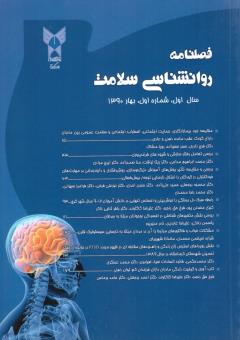بررسي نقش متغيرهاي شناختي در افسردگي نوجوانان مبتلا به سرطان. نویسندگان: ( یاسمن بانکی / علیرضا عابدین / نادر منیرپور)
محورهای موضوعی : روانشناسی مبتلایان به سرطان
کلید واژه: افسردگي, متغيرهاي شناختي, نوجوانان مبتلا به سرطان,
چکیده مقاله :
چكيده پژوهش حاضر با هدف بررسي نقش متغيرهاي شناختي در افسردگي نوجوانان مبتلا به سرطان طراحي و اجرا گرديد. جامعه¬ي اين پژوهش شامل نوجوانان 12 تا 18 ساله¬¬اي كه تشخيص ابتلا به سرطان دريافت كرده بودند، بود.بدين منظور 174 نوجوان به وسيله¬ي نمونه¬گيري در دسترس از چندين مركز درماني سرطان و بيمارستان¬هاي تهران، اصفهان و شيراز انتخاب شدند. اطلاعات از طريق تكميل پرسشنامه توسط نوجوانان، جمع¬آوري گشت. پرسشنامه¬ها¬ شامل پرسشنامه¬ي افسردگي بك- ويژه¬ي مراقبت¬هاي اوليه، پرسشنامه¬ي راهبردهاي مقابله¬اي براي موقعيت¬هاي استرس¬زا، پرسشنامه¬ي ادراك بيماري و منبع كنترل سلامت-فرم c، بود. نتايج تحليل داده¬ها نشان داد كه افسردگي نوجوان با منبع كنترل سلامت شانس، مقابله¬ي هيجان¬مدار و ادراك بيماري، همبستگي مثبت و با مقابله¬ي مسئله¬مدار و مقابله¬ي اجتناب، همبستگي معكوس معنادار دارد. نتايج تحليل رگرسيون چند متغيري نيز آشكار ساخت كه راهبرد مقابله¬ي هيجان¬مدار، راهبرد مقابله¬ي مسئله¬مدار و ادراك از بيماري، به احتمال بيشتري افسردگي نوجوان را پيش¬بيني مي¬كند.
Abstract The present study was designed and conducted with the purpose of investigating the role of cognitive variables in depression of adolescents with cancer. The participants in the study were adolescents between 12-18 years old diagnosed with cancer. 174 adolescents were selected through convenient sampling method from a number of cancer treatment centers and hospitals in Tehran, Isfahan, and Shiraz. Qualitative data were collected with Beck Depression Inventory for Primary Care (BDI-PC), Coping Inventory for Stressful Situations (CISS-21), Illness Perception Inventory (short form), and Multidimensional Health Locus of Control scale form C (MHLC-C) which were completed by the adolescents. The results revealed that there was a significant positive correlation between adolescent depression with chance health locus of control, emotion focused coping, illness perception and inverse correlation with problem focused and avoidance coping. The results of multivariable regression analysis showed that emotion focused coping, problem focused coping and illness perception were more likely to predict the adolescent depression.
منابع
كراتوچويل،آر.، جي،موریس، توماس آر. (1384). روانشناسي باليني كودك (روش¬هاي درمانگري).ترجمه:رضا نائينيان و همکاران، تهران، انتشارات رشد.
حاجبی، ا.، پیروی، ح. و پناغی، ل. ( 1385). بررسی شیوه¬های مقابله¬ای و رابطه آن با سلامت روان در دانشجویان ورودی جدید دانشگاه تهران سال 85- 84".سومین سمینار سراسری بهداشت روانی دانشجویان،تهران، دانشگاه علم و صنعت، 57- 52.
مسعودنیا، ا. (1387). ادراک بیماری و تاخیر در کمک جویی در زنان با علایم سرطان پستان: ارزیابی الگوی خودگردانی. مجله¬ی علوم رفتاری، 3، 282- 271.
ملکیان، آ.، علی¬زاده، ا.، و احمدزاده، غ.ح. (1386). افسردگی و اضطراب در بیماران مبتلا به سرطان. مجله¬ی تحقیقات علوم رفتاری، (2)5، 119- 115.
منيرپور، ن. (1388).بررسي مدل¬هاي ساختاري براي تبيين افسردگي و اضطراب در مبتلايان به بيماري¬هاي عروق كرونر قلب تحت مداخلات CABG و PCI.پايان¬نامه دكتري چاپ نشده، دانشكده¬ي علوم تربيتي و روانشناسي، دانشگاه تهران، تهران.
Bowers, L., &Boyle, D. A. (2003). Depressed patients with advanced cancer.Clinical Journal of OncolNurs, 7¬(3), 281-288.
Bryant, R. A., & Harvey, A. G. (1995).Avoidant coping style and post- traumatic stress following motor vehicleaccidents.Journal of Behaviour Research and Therapy, 33, 631-635.
Burke, P., & Elliott, M. (1999). Depression in pediatric chronic illness: A diathesis-stress model.Journal of Psychosomatics, 40, 5–17.
Calsbeek, H., Rijken, M., Bekkers, M. J. T. M., Van Berge Henegouwen, G. P., & Dekker, J. (2006). Coping in adolescents and young adults with chronic digestive disorders: Impact on school and leisure activities.Journal of Psychology and Health, 21(4), 447-462.
Eiser, C., Hill, J. J., & Vance, Y.H. (2000).Examining the psychological consequences of surviving childhood cancer: Systematic review as a research method in pediatric psychology.Journal of Pediatric Psychology,25¬(6), 449-460.
Giannousi, Z., Manaras, I.,Georgoulias, V,.&Samonis, G. (2010). Illness perceptions in greek patients with cancer: A validation of the Revised-Illness Perception Questionnaire.Journal of Psycho-Oncology, 19 (1), 85- 92.
Goldman, A. (2006). Symptoms in children/young people with progressive malignant disease: United Kingdom children’s cancer study group/pediatric oncology nurses forum survey.Journal of Pediatrics,117¬(6), 1179-1186.
Graci, G. (2001). Optimism, health of control, and quality of life women with intial versus recurrent breast cancer.Unpublished doctoral dissertation, University of North Texas.
Husain, M. O., Dearman, S. P., Chaudhry, I. B., Rizvi, N., &Waheed, W. (2008).The relationship between anxiety, depression and ilness perception in tuberculosis patients in Pakistan.Journal of Practice and Epidemiology in Mental Health, 4(1), 4 -21.
Kim, L. S., Sandler, I. N., &Tein, J. Y. (1997).Locus of control as a stress moderatorand mediator in children of divorce.Journal of Abnormal Child Psychology, 25, 145-155.
Matziou, V., Perdikaris, P., Galanis, P., Dousis, E., &Tzoumakas, K. (2008).Evaluating depression in a sample of children and adolescents with cancer in Greece.Journal of International Nursing Review, 55, 314–319.
Meijer, S. A., Sinnema, G., Bijstra, J. O., Mellenbergh, G. J., &Wolters, W.G. (2002).Coping styles and locus of control as predictors for psychological adjustment of adolescents with a chronic illness.Journal of Social Science a Medicine, 54, 1453–1461.
Nordin, K., Berglund, G., Glimelius, B., &Sjoden, P. O. (2001).Predicting anxiety and depression among cancer patients: A clinical model.Eur Journal of Cancer,37¬(3), 376- 384.
Pakenham, K. (2004).Coping with multiple sclerosis: Development of a measure.Journal of Psychology, Health, and Medicine,6, 411-428.
Park, L., &Gaffey, A. E. (2007).Relationships between psychosocial factors and health behavior change in cancer survivors: an integrative review.Journal of Annals of Behavioral Medicine : a Publication of the Society of Behavioral Medicine (Ann Behav Med), 34¬(2), 115-134.
Perrin, E., & Shapiro, E. (1985).Healthy locus of control beliefs of healthychildren, children with a chronic physical illness, and their mothers.Journal of Pediatric, 107, 627- 633.
Piko, O. (2001). Gender differences and similarities in adolescents’ ways of coping.Journal of Psychological Record, 51, 223-236.
Pirl, W. F., Siegel, G. L., Goode, M. J., & Smith, M. R. (2002).Depression in men receiving androgen deprivation therapy for prostate cancer.Journal ofPsychooncology, 11(6), 518- 523.
Spiegel, D., & Giese-Davis, J. (2003).Depression and cancer: mechanisms and disease progression.Journal of Biol Psychiatry, 54, 269–282.
Ssleung, S. S., Steinbeck, K. S., Morris, S. L., Kohn, M. R., Towns, S. J., & Bennett, D. L. (1997). Chronic illness perception in adolescence: Implications for the doctor-patient relationship.Journal of Paediatrics and Child Health, 33(2), 107-112.
Ubbiali, A., Donati, D., Chiorri, C., Bregani, V,.Cattaneo, E., Maffei, C., &Visintini, R. (2008).The usefulness of the multidimensional health locus of control form C (MHLC-C) for HIV-subjects: An italian study. Journal of AIDS Care, 20(4), 495-502.
Weisz, J. R., Stevens, J. S., & Curry, J. F. (1989).Control-related cognitions and depression among inpatient children and adolescents.Journal of AmAcademic Child Adolescent Psychiatry, 28, 358-363.
Winter, L. B., Steer, R. A., Jones-Hicks, L., & Beck, A. T. (1999).Screening for major depression disorders in adolescent medical outpatients with the Beck Depression Inventory for Primary Care.Journal of Adolescent Health, 24(6), 389-394.
Woodgate, R. L. (1999). A Review of the Literature on Resilience in the Adolescent With Cancer: Part II.Journal of Pediatric Oncology Nursing, 16¬¬(2), 78-89.
Zebrack, B.J., Gurney, J.G., &Oeffinger, K. (2004). Psychological outcomes in long-term survivors of childhood brain cancer: A report from the childhood cancer survivor study.Journal of Clinical Oncology, 22¬(6), 999-1006.
Zebrack, B.J., Zeltzer, L.K., &Whitton, J. (2002).Psychological outcomes in long-term survivors of childhood Leukemia, Hodgkin's disease, and Non-hodgkin's Lymphoma: A report from the childhood cancer survivor study.Journal of Pediatrics, 110¬(1), 42-52.

